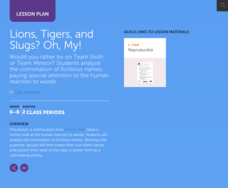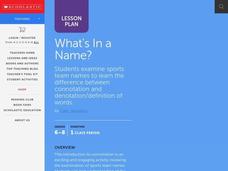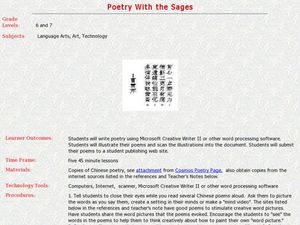Curated OER
Mental Images in Reading Comprehension
Students use textual clues to create mental images and interpret characters moods and actions. They visualize the setting, characters and events.
Curated OER
Vivid Mental Images
Students listen to a chapter of "The Tale of Despereaux" while creating vivid mental images. They discuss the images before listening to the next chapter and illustrating those images. Each day, they repeat the exercise and add to a...
Curated OER
The Power of Mental Images: Visualizing Literature
Looking for a powerful reading comprehension method? Try visualization! Learners use this strategy to increase comprehension of a chapter book selected by the teacher. As an assessment, individuals or small groups draw pictures of the...
Curated OER
Seeing the Image in Imagery: A Lesson Plan Using Film
In our increasingly visual society, it is often difficult for some readers to create a mental picture of a picture created only with words. An image-rich text like F. Scott Fitzgerald's The Great Gatsby can therefore, present a real...
Curated OER
The Real Tooth Fairy
First graders listen to the story "The Real Tooth Fairy and explore the concept of mental images. In this mental image lesson, 1st graders create a mental image of what the tooth fairy looks like. Students listen to the teacher model...
Curated OER
The Power of Mental Images: Visualizing Literature
With a chapter book in hand, readers practice visualizing the events and characters of the story. The instructional activity gives suggestions of novels that are rich in detail to help facilitate the process. Drawings from what they read...
Curated OER
A Picture is worth a Thousand Words, But a Word Can be worth a Thousand Pictures!
Students examine the process of creating mental images, or visualization, as a tool to increase reading comprehension. They practice visualizing while the teacher reads a passage to them by drawing what they hear focusing on including...
Curated OER
Sketch It to Stretch It!
Third graders listen to a read aloud of a chapter of a book while creating a mental image that shows comprehension. They draw pictures of their mental images. Next, they read a passage of a book silently and sketch the images they create...
Scholastic
Lions, Tigers, and Slugs? Oh, My!
Explore the power of words with your class by analyzing the connotations of fictitious sports team names. Learners discuss team names and the mental images they convey. They create logos to illustrate the meanings and...
Curated OER
What's In a Name?
Introduce your language arts class to connotation, denotation, and diction. Middle schoolers identify and differentiate between the connotative and denotative meanings of words by analyzing the fictitious sports team names....
Curated OER
What Makes Jokes Funny?
Explore how language is used for comic effect. Middle schoolers determine which of the three formulas for jokes (double meanings, unexpected outcome, humorous mental image) make each of 18 classic, corny examples funny. They complete a...
Curated OER
Maus: Making a Visual Representation
How do you represent a tragic event? Are stories of tragic events better left untold? After reading chapter two of Maus and studying other representations of the Holocaust (suggestions are included), class members create a representation...
Curated OER
Picture This
Students examine how to create mental images to help them comprehend what they read. They discuss what it means to visualize and they draw a mental picture of what they read. Students draw a picture of what they see in their minds while...
Curated OER
In Search of Shakespeare . Images of Othello: A Shakespearean WebQuest | PBS
Students look closely at the text of "Othello." They use an online dictionary, and use various search engines. Students use an online Shakespeare concordance and make intelligent decisions about character. They write an intelligent...
Curated OER
Improving Writing Through the Use of Imagery
Pupils add details to sentence starters by creating mental images of what they are writing. They expand the vocabulary they use in their writing.
Curated OER
Creating Images to Fill in the Holes
Students encounter the effective method to improve their comprehension of visualizing, or using the text on the page to create a mental image. They increase comprehension by essentially digesting the text in two different...
Curated OER
Exposes in Different Eras: The Work of Dorothea Dix and Burton Blatt
Students discover that Dorothea Dix was the first to make the pubic aware of the terrible living conditions of people with mental illness in the 1800's. They evaluate the influence of citizen action on public policy.
Curated OER
Poetry With the Sages
Students write poems and input them into a word processing program. In this poetry lesson, students listen to Chinese poems and draw mental images. Students compose poems and illustrate them. Students share their work.
Curated OER
A Sense of Place
Students read "Fish Tale: Falling For a Live One" from The New York Times and discuss the methods and techniques the writer uses to create a strong mental image. Students pick a place in their community they wish to write about and...
Curated OER
Literature: Mapping the Mockingbird
Students read Harper Lee's To Kill a Mockingbird, focusing on setting. They list items that create mental images of the novel's setting along with location references to characters and events. Using posterboard, they construct physical...
Curated OER
Antonyms, synonyms and homophones
Shed light on what antonyms, synonyms, and homophones are. In this lesson, upper elementary schoolers create pairs using an antonym, a homophone, and/or a synonym. Then they play an antonym matching game.
Curated OER
Close Your Eyes and Imagine...
Students practice the techniques and strategies to become more fluent readers through visualization. They read and construct mental images from the reading of a text. The book, "Charlotte's Web," by E.B. White is read in class and then...
Novelinks
Zach’s Lie: Guided Imagery
Close your eyes and picture a time where you decided to tell the truth to someone. What were you wearing? How did you feel? Such prompts begin a guided imagery activity for Zach's Lie. Directions for creating an environment conducive to...
Curated OER
Bud, Not Buddy: Guided Imagery Exercise
Develop readers’ awareness of the visual power of language with a guided imagery exercise. Set the stage and create the mood with dim lights, soft music and potpourri. Then read the provided section of Bud, Not Buddy. Next, invite...























